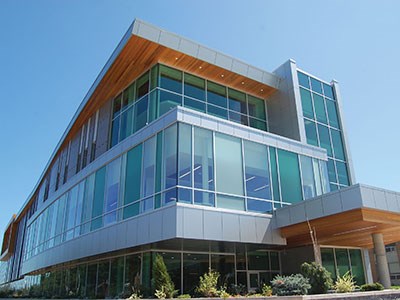Sault College has been known as a technical college since it opened its doors more than 40 years ago. But with the recent launch of its new School of Business, the school is going in a new direction.
Launched in June, the School of Business is the culmination of a more concentrated effort to attract students to study business at Sault College.
The school will offer new programs, articulation agreements with other post-secondary institutions and a recruitment campaign geared to enhancing the skills of vocational grads.
Colin Kirkwood, the business school’s dean, said after looking at what other schools were offering in business education, Sault College determined it needed to fill in some gaps and offer more in the way of business training.
“We’re doing quite a few things to change it up and really create a situation where students are encouraged to come into our college for business,” Kirkwood said.
Priority one was upgrading the website, including video testimonials from satisfied students, to make it more appealing to prospective students.
“Anyone that goes there is going to get the message that we have a high-quality school and that when they finish with us they’re going to get the education that they wanted and then some,” Kirkwood said. The school wants its programs to appeal to students looking to gain employment, but also those who plan to further their education following graduation, he said. It’s now in the process of setting up articulation agreements with other post-secondary institutions so that students’ credits are transferrable between schools.
Currently, students studying professional golf management can get a one-toone credit transfer with Humber College in Toronto, which allows them to go directly into the second year of that school’s program. Sault College is also working on an agreement with Algoma University that would give students advanced standing if they want to continue their education there.
New programs are also in the works in the areas of human resources management, marketing management and international business.
Programs may be offered in conjunction with studies at other post-secondary institutions, Kirkwood said.
The school also wants students studying other subjects to consider enhancing their education with a business component through the pathway program, an eight-month course of study that earns students a business management graduate certificate.
“It really doesn’t matter what your ambition is,” Kirkwood said. “If you’re in front of a potential employer and you have a resume that includes some vocational training, that’s one thing. If you have a resume that has some vocational training and some business training, that really puts you in a much stronger position to compete for employment.”
Graduates are more attractive to business owners if they come to the job with some insight into the workings of their business, he added.
Business leaders in the Sault community have been very supportive of the idea, and that area of education is particularly relevant at a time of growth of small businesses in Northern Ontario, Kirkwood said.
Studying at Sault College is enhanced by the natural attributes of the area: an abundance of outdoor activities, a safe community, and small class sizes—benefits students can find in Northern Ontario that they can’t get at a big school in Toronto, Kirkwood said.
Statistics show that students agree: student satisfaction rates for those studying business is in excess of 90 percent.
It’s something Northern students have known for years, but a recruitment tool the college hopes to lean on in the next few years as it ramps up its efforts to attract international students
“We definitely do have some features that other community colleges couldn’t necessarily duplicate,” Kirkwood said. “Not many colleges can say they have Lake Superior in their backyard.”




